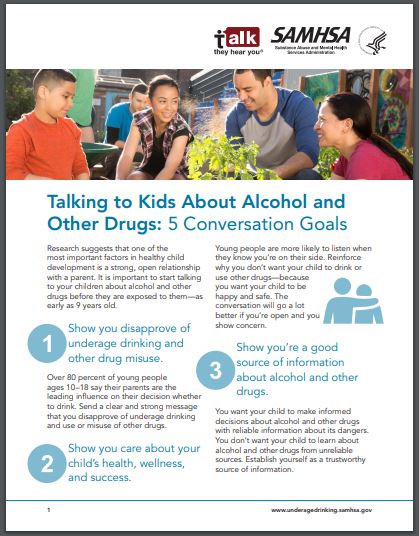
Research suggests that one of the most important factors in healthy child development is a strong, open relationship with a parent. It is important to start talking to your children about alcohol and other drugs before they are exposed to them.
The “Talk. They Hear You.” Underage Drinking Prevention National Media Campaign empowers parents and caregivers to talk with children early about alcohol and other drug use. Click the image below to learn more.
The “Talk. They Hear You.” campaign aims to accomplish the following:
- Increase parents’ awareness of the prevalence and risk of underage drinking and substance use;
- Equip parents with the knowledge, skills, and confidence to prevent underage drinking and substance use; and
- Increase parents’ actions to prevent underage drinking and substance use.
High rates of youth alcohol use, shifting state laws regarding marijuana, and the nation’s opioid crisis are prevalent health concerns that affect America’s parents and caregivers. Preventing underage alcohol and substance use is critical for the following reasons:
- Approximately 88,000 Americans die from alcohol-attributed causes each year, making alcohol the third leading preventable cause of death in the United States.
- An estimated 2.1 million people ages 12 or older had an opioid use disorder, and nearly 30 percent of those who use marijuana may have some degree of marijuana use disorder.
Start Talking.
Help for Talking About Alcohol and Other Drugs
5 Conversation Goals
Action Plan
Answering Your Child’s Tough Questions
Family Agreement Form: Avoiding Alcohol
Keeping Your Kids Safe Brochures
Impaired Driving: Talk With Your Kids
According to the CDC, Ethyl alcohol, or ethanol, is an intoxicating ingredient found in beer, wine, and liquor. Alcohol is produced by the fermentation of yeast, sugars, and starches.
Alcohol affects every organ in the body. It is a central nervous system depressant that is rapidly absorbed from the stomach and small intestine into the bloodstream. Alcohol is metabolized in the liver by enzymes. However, the liver can only metabolize a small amount of alcohol at a time, leaving the excess alcohol to circulate throughout the body. The intensity of the effect of alcohol on the body is directly related to the amount consumed.
Early use of alcohol increases risk of addiction and engagement in risky behaviors. Parents can prevent early alcohol use by talking to their kids, setting clear expectations, and building Developmental Assets.
Risks of Alcohol Consumption in Teens
Young people who drink are more likely to be the victims of violent crime, to be involved in alcohol-related traffic accidents, and to have depression and anxiety. Other risky behaviors are also linked to early drinking. Young people who start using alcohol before age 21 are more likely to:
Be involved in violent behaviors
Attempt suicide
Engage in unprotected sex or have multiple sex partners
Develop alcohol problems in later life
Effects of Early Drinking on the Teen Brain
Alcohol affects the parts of the brain that control:
Coordination
Memory
Emotion
Planning
Social behavior
Thinking
Large amounts of alcohol can also slow down a person’s ability to relay information, triggering depression, agitation, and memory loss. Long-term heavy drinking can also shrink brain mass due to reduction in brain cell size.
Some researchers speculate that teens are more vulnerable to addiction because the pleasure center of the brain matures before the part of the brain responsible for impulse control and executive decision making. In other words, teenagers’ capacity for pleasure reaches adult proportions well before their capacity for sound decision making does.
Because the adolescent brain is still maturing, alcohol can interfere with its growth and development. People who have their first drink at age 14 or younger are six times more likely to develop alcohol problems than those who don’t try alcohol until the legal drinking age.
Building Assets Reduces Risky Behaviors
Data from the 2021 Midland County Youth Study reflects how the assets experienced by young people affect the choices they make regarding risk-taking behaviors like using alcohol and getting drunk.
- The Legacy Center for Community Success. (2021). Midland County Youth Study.
Talk to Your Kids Early and Often
You are the most influential person in your child’s life. Talk to your children often and set clear boundaries. Build up their assets , and give them easy ways to excuse themselves from risky behavior. For more ideas on talking to your teen, visit https://www.samhsa.gov/underage-drinking.

